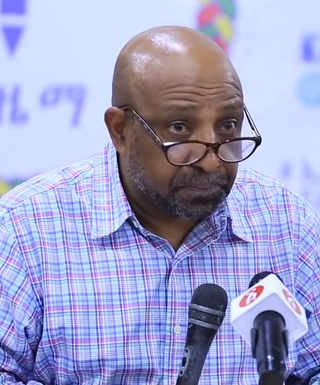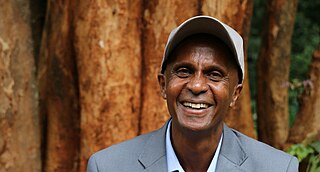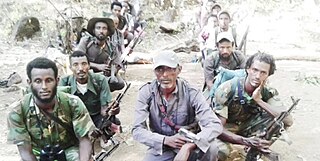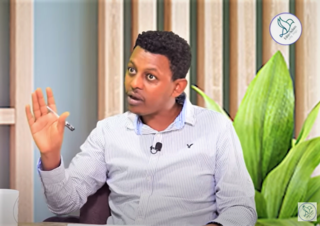
Berhanu Nega is an Ethiopian politician who is serving as the current Minister of Education of Ethiopia. He previously was the mayor elect of Addis Ababa, Ethiopia, in the 2005 Ethiopian general elections. He is a founding chairman of the Rainbow Ethiopia: Movement for Democracy and Social Justice and a Deputy Chairman of Coalition for Unity and Democracy (CUD), for whom he served as chief election campaign strategist. He is also the co-founder and leader of Ginbot 7, an anti-government rebel group. Until mid-2018, he was labelled a terrorist by the Ethiopian government.
The Ethiopian Democratic Union or EDU, also known as Teranafit, was one of the political parties that formed in opposition to the Derg regime of Ethiopia. It merged with the Ethiopian Democratic Party to form the Ethiopian Democratic Unity Party.

Ethio telecom, previously known as the Ethiopian Telecommunications Corporation, is an Ethiopian telecommunication company serving as the major internet and telephone service provider. Ethio telecom is owned by the Ethiopian government and maintains a monopoly over all telecommunication services in Ethiopia. Based in Addis Ababa, it is one of the "Big-5" group of state owned corporations in Ethiopia, along with Ethiopian Airlines, the Commercial Bank of Ethiopia, Ethiopian Insurance Corporation, and the Ethiopian Shipping Lines.
In Ethiopia, the Internet penetration rate is 25% as of January 2022, and it is currently attempting a broad expansion of access throughout the country. These efforts have been hampered by the largely rural makeup of the Ethiopian population and the government's refusal to permit any privatization of the telecommunications market. Only 360,000 people had Internet access in 2008, a penetration rate of 0.4%. The state-owned Ethio Telecom is the sole Internet service provider (ISP) in the country. Ethio Telecom comes in at very high prices which makes it difficult for private users to purchase it.
Yeroo was the first private Afaan Oromo newspaper published in Qubee. It distributed weekly newspapers mainly around the cities and towns of the Oromia region of Ethiopia. Alongside another independent newspaper URJII, Yeroo was the last private Oromo press closed down due to media restrictions in Ethiopia. Due to being independent, the media faced difficulties from the Ethiopian government since its beginning during its registration and establishment. A few weeks after its publications, security problems and financial restrictions imposed by the government caused the newspaper to be suspended. Its website version is Jimma Times (JT), which has remained online after Yeroo newspaper was closed. JT has been the first media to break several news stories before other media outlets, including the story of former Ethiopian PM Tamrat Layne, who became "born again" and left politics, the acceptance of Ethiopian Airlines into the Star Alliance as well as on the decision of the top opposition party Medrek to seek a re-run of disputed Election 2010. Various international media have used news content from Yeroo's Jimma Times, including United Press International (UPI), Epoch Times and Voice of America (VOA) radio. The Jimma Times has also been quoted by and its content used by many Ethiopian newspapers and sites including Capital Ethiopia, Addis Neger, Gadaa.com, Opride.com, Ethio Channel, Awramba Times and African Monitor. Its website/online version has also been suspended for many years after it faced frequent blockage from the government that often censors online media.

Dawit Kebede is an Ethiopian journalist and winner of the 2010 CPJ International Press Freedom Award.

Ginbot 7 is an Ethiopian opposition political organization, founded in 2008 by Andargachew Tsige and Berhanu Nega.

Eskinder Nega is an Ethiopian journalist, blogger and politician who has been jailed at least ten times by the Ethiopian government on convictions for treason and terrorism.
Andargachew Tsege, also known as Andy Tsige or Andy Tsege, is an Ethiopian politician. He is the chief executive officer of ESAT, a nonprofit independent media outlet in Ethiopia. He previously served as the secretary-general of Ginbot 7, a political party that was labeled as a terrorist group by the Ethiopian government until 2018. On 23 June 2014, he was abducted by Ethiopian security forces while in transit in Yemen's Sana'a International Airport and held at an unknown location in Ethiopia. On 29 May 2018, he was freed by the Ethiopian government following political reform by Prime Minister Abiy Ahmed.

Gobe Melke was an Ethiopian guerrilla fighter and former commander of the Fano militia.

Abiy Ahmed Ali is an Ethiopian politician serving as the third Prime Minister of Ethiopia since 2018, and as the leader of the Prosperity Party since 2019. He was awarded the 2019 Nobel Peace Prize "for his efforts to achieve peace and international cooperation, and in particular for his decisive initiative to resolve the border conflict with neighbouring Eritrea". Abiy served as the third chairman of the Ethiopian People's Revolutionary Democratic Front (EPRDF) that governed Ethiopia for 28 years and the first person of Oromo descent to hold that position. Abiy is a member of the Ethiopian parliament, and was a member of the Oromo Democratic Party (ODP), one of the then four coalition parties of the EPRDF, until its rule ceased in 2019 and he formed his own party, the Prosperity Party.

Ethnic discrimination in Ethiopia during and since the Haile Selassie epoch has been described using terms including "racism", "ethnification", "ethnic identification, ethnic hatred, ethnicization", and "ethnic profiling". During the Haile Selassie period, Amhara elites perceived the southern minority languages as an obstacle to the development of an Ethiopian national identity. Ethnic discrimination occurred during the Haile Selassie and Mengistu Haile Mariam epochs against Hararis, Afars, Tigrayans, Eritreans, Somalis and Oromos. Ethnic federalism was implemented by Tigray People's Liberation Front (TPLF) leader Meles Zenawi and discrimination against Amharas, Ogaden, Oromos and other ethnic groups continued during TPLF rule. Liberalisation of the media after Abiy Ahmed became prime minister in 2018 led to strengthening of media diversity and strengthening of ethnically focussed hate speech. Ethnic profiling targeting Tigrayans occurred during the Tigray War that started in November 2020.
This Timeline of the Tigray War is part of a chronology of the military engagements of the Tigray War, a civil war that began in the Tigray Region of Ethiopia in early November 2020.

Abiy Ahmed is currently the third serving Prime Minister of Ethiopia. In 2018, he became the first ever Oromo descent to assume the role of prime minister in the history of Ethiopia. He won the Nobel Peace Prize in his second year as a prime minister of Ethiopia in 2019 becoming the eighth African laureates to win the award for peace.

Since the 1990s, the Amhara people of Ethiopia have been subject to ethnic violence, including massacres by Tigrayan, Oromo and Gumuz ethnic groups among others, which some have characterized as a genocide. Large-scale killings and grave human rights violations followed the implementation of the ethnic-federalist system in the country. In most of the cases, the mass murders were silent with perpetrators from various ethno-militant groups—from TPLF/TDF, OLF–OLA, and Gumuz armed groups.

Tamagne Beyene is an Ethiopian human rights activist, former actor, comedian and media personality. Born in Gondar, Tamagne was recruited to the Gondar Traditional Group in 1981. He soon joined the Ethiopian National Theatre in 1983, performing as comedian, actor, singer, drummer and saxophonist.

Habtamu Ayalew Teshome is an Ethiopian journalist and political analyst who was formerly imprisoned and tortured as an opposition leader in Ethiopia during the EPRDF rule. He analyzes the daily live Amharic Ethio 360 Ethiopian news broadcast from its headquarters in Washington D.C., through satellite TV, and social media since 2019.

Political repression is a visible scenario under the leadership of Prime Minister Abiy Ahmed after 2018, characterized by severe human rights violation, restriction of press, speeches, dissents, activism and journalism that are critical to his government. Similar to TPLF-led EPRDF regime, there was a raise of censorship in the country, particularly internet shutdowns under the context of anti-terror legislation labelling them "disinformation and war narratives" since the raise of armed conflict in Ethiopia. In June 2018, Abiy unblocked 64 internet access that include blogs and news outlets.
Getachew Assefa is an Ethiopian politician and senior member of the Tigray People's Liberation Front (TPLF). He had served as the Director General of the National Intelligence and Security Service (NISS) from 2001 until Prime Minister Abiy Ahmed came to power in 2018.












